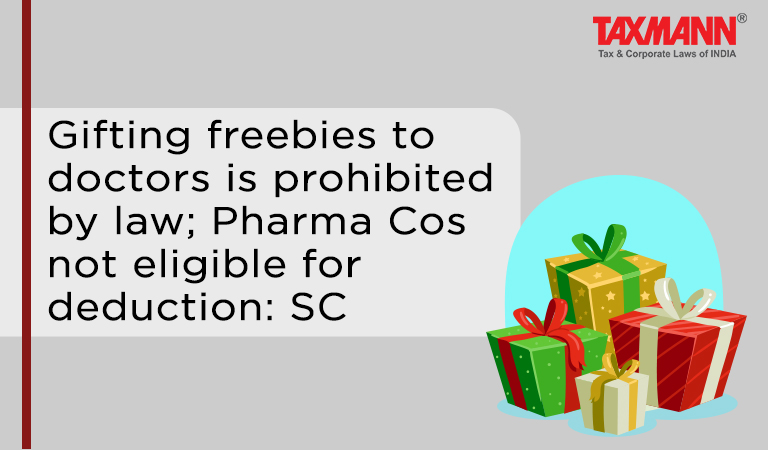Gifting freebies to doctors is prohibited by law; Pharma Cos not eligible for deduction: SC
- Blog|News|Income Tax|
- 3 Min Read
- By Taxmann
- |
- Last Updated on 24 February, 2022

Case Details: Apex Laboratories (P.) Ltd. v. DCIT - [2022] 135 taxmann.com 286 (SC)
Judiciary and Counsel Details
-
- Uday Umesh Lalit and S. Ravindra Bhat, JJ.
Facts of the Case
The Central Board of Direct Taxes (CBDT) vide circular no. 5/2012, dated 01-08-20212, had clarified that expenses incurred by pharmaceutical and allied health sector industries for distribution of incentives (freebies) to medical practitioners are not eligible for deduction. The benefit of the deduction is denied in view of Explanation 1 to Section 37(1). Said explanation denies the application of the benefit for any purpose which is an ‘offence’ or ‘prohibited by law’.
The assessee contended that Indian Medical Council (Professional Conduct, Etiquette and Ethics) Regulations, 2002, prohibits medical practitioners from accepting freebies. No corresponding prohibition in the form of any binding norm was imposed on the pharmaceutical companies gifting them. Thus, the benefit of deduction shouldn’t be denied to the assessee being a pharmaceutical company. The matter reached the Supreme Court of India.
Supreme Court Held
The Supreme Court of India held that a narrow interpretation of Explanation 1 to Section 37(1) defeats the purpose for which it was inserted, i.e., to disallow an assessee from claiming a tax benefit for its participation in illegal activity.
When acceptance of freebies is punishable, pharmaceutical companies cannot be granted the tax benefit for providing such freebies.
The medical practitioners have a quasi-fiduciary relationship with their patients. A doctor’s prescription is considered the final word on the medication to be availed by the patient, even if the cost of such medication is unaffordable or barely within the economic reach of the patient. Such is the level of the trust reposed in doctors.
Therefore, a doctor’s prescription can be manipulated and driven by the motive to avail of the freebies offered to them by pharmaceutical companies, ranging from gifts such as gold coins, fridges and LCD TVs to funding international trips for vacations or attending medical conferences.
Further, these freebies are technically not ‘free’. The cost of supplying such freebies is usually factored into the drug, driving prices up, thus creating a perpetual publicly injurious cycle. The threat of prescribing medication that is significantly marked up over effective generic counterparts instead of such a quid pro quo exchange was taken cognizance of by the Parliamentary Standing Committee on Health and Family Welfare.
It is crucial to note that the agreement between the pharmaceutical companies and the medical practitioners in gifting freebies for boosting sales of prescription drugs is also violative of Section 23 of the Contract Act, 1872.
In the present case, the freebies given by the assessee to the doctors directly resulted in exposing the recipients to the odium of sanctions, leading to a ban on their practice of medicine. Those sanctions are mandated by law, as they are embodied in the code of conduct and ethics, which are normative, and have legally-binding effects.
The conceded participation of the assessee- i.e., the provider or donor- was prohibited, as far as their receipt by the medical practitioners was concerned. That medical practitioner were forbidden from accepting such gifts, or “freebies” was no less a prohibition on the part of their giver, or donor, i.e., assessee.
Thus, the freebies distributed by the assessee were squarely covered within the scope of Explanation 1 to Section 37(1) and accordingly not allowable as a deduction.
Disclaimer: The content/information published on the website is only for general information of the user and shall not be construed as legal advice. While the Taxmann has exercised reasonable efforts to ensure the veracity of information/content published, Taxmann shall be under no liability in any manner whatsoever for incorrect information, if any.

Taxmann Publications has a dedicated in-house Research & Editorial Team. This team consists of a team of Chartered Accountants, Company Secretaries, and Lawyers. This team works under the guidance and supervision of editor-in-chief Mr Rakesh Bhargava.
The Research and Editorial Team is responsible for developing reliable and accurate content for the readers. The team follows the six-sigma approach to achieve the benchmark of zero error in its publications and research platforms. The team ensures that the following publication guidelines are thoroughly followed while developing the content:
- The statutory material is obtained only from the authorized and reliable sources
- All the latest developments in the judicial and legislative fields are covered
- Prepare the analytical write-ups on current, controversial, and important issues to help the readers to understand the concept and its implications
- Every content published by Taxmann is complete, accurate and lucid
- All evidence-based statements are supported with proper reference to Section, Circular No., Notification No. or citations
- The golden rules of grammar, style and consistency are thoroughly followed
- Font and size that’s easy to read and remain consistent across all imprint and digital publications are applied



 CA | CS | CMA
CA | CS | CMA
